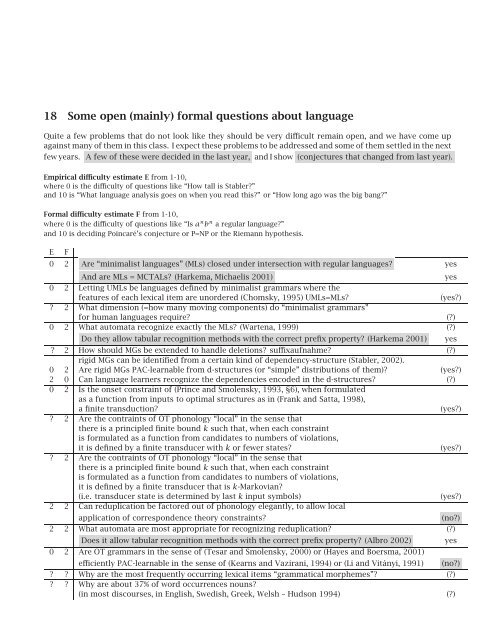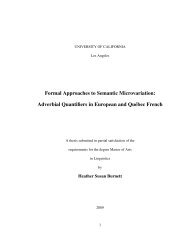Notes on computational linguistics.pdf - UCLA Department of ...
Notes on computational linguistics.pdf - UCLA Department of ...
Notes on computational linguistics.pdf - UCLA Department of ...
You also want an ePaper? Increase the reach of your titles
YUMPU automatically turns print PDFs into web optimized ePapers that Google loves.
18 Some open (mainly) formal questi<strong>on</strong>s about language<br />
Quite a few problems that do not look like they should be very difficult remain open, and we have come up<br />
against many <strong>of</strong> them in this class. I expect these problems to be addressed and some <strong>of</strong> them settled in the next<br />
few years. A few <strong>of</strong> these were decided in the last year, and I show (c<strong>on</strong>jectures that changed from last year).<br />
Empirical difficulty estimate E from 1-10,<br />
where 0 is the difficulty <strong>of</strong> questi<strong>on</strong>s like “How tall is Stabler?”<br />
and 10 is “What language analysis goes <strong>on</strong> when you read this?” or “How l<strong>on</strong>g ago was the big bang?”<br />
Formal difficulty estimate F from 1-10,<br />
where 0 is the difficulty <strong>of</strong> questi<strong>on</strong>s like “Is a n b n a regular language?”<br />
and 10 is deciding Poincaré’s c<strong>on</strong>jecture or P=NP or the Riemann hypothesis.<br />
E F<br />
0 2 Are “minimalist languages” (MLs) closed under intersecti<strong>on</strong> with regular languages? yes<br />
And are MLs = MCTALs? (Harkema, Michaelis 2001) yes<br />
0 2 Letting UMLs be languages defined by minimalist grammars where the<br />
features <strong>of</strong> each lexical item are unordered (Chomsky, 1995) UMLs=MLs? (yes?)<br />
? 2 What dimensi<strong>on</strong> (=how many moving comp<strong>on</strong>ents) do “minimalist grammars”<br />
for human languages require? (?)<br />
0 2 What automata recognize exactly the MLs? (Wartena, 1999) (?)<br />
Do they allow tabular recogniti<strong>on</strong> methods with the correct prefix property? (Harkema 2001) yes<br />
? 2 How should MGs be extended to handle deleti<strong>on</strong>s? suffixaufnahme? (?)<br />
rigid MGs can be identified from a certain kind <strong>of</strong> dependency-structure (Stabler, 2002).<br />
0 2 Are rigid MGs PAC-learnable from d-structures (or “simple” distributi<strong>on</strong>s <strong>of</strong> them)? (yes?)<br />
2 0 Can language learners recognize the dependencies encoded in the d-structures? (?)<br />
0 2 Is the <strong>on</strong>set c<strong>on</strong>straint <strong>of</strong> (Prince and Smolensky, 1993, §6), when formulated<br />
as a functi<strong>on</strong> from inputs to optimal structures as in (Frank and Satta, 1998),<br />
a finite transducti<strong>on</strong>? (yes?)<br />
? 2 Are the c<strong>on</strong>traints <strong>of</strong> OT ph<strong>on</strong>ology “local” in the sense that<br />
there is a principled finite bound k such that, when each c<strong>on</strong>straint<br />
is formulated as a functi<strong>on</strong> from candidates to numbers <strong>of</strong> violati<strong>on</strong>s,<br />
it is defined by a finite transducer with k or fewer states? (yes?)<br />
? 2 Are the c<strong>on</strong>traints <strong>of</strong> OT ph<strong>on</strong>ology “local” in the sense that<br />
there is a principled finite bound k such that, when each c<strong>on</strong>straint<br />
is formulated as a functi<strong>on</strong> from candidates to numbers <strong>of</strong> violati<strong>on</strong>s,<br />
it is defined by a finite transducer that is k-Markovian?<br />
(i.e. transducer state is determined by last k input symbols) (yes?)<br />
2 2 Can reduplicati<strong>on</strong> be factored out <strong>of</strong> ph<strong>on</strong>ology elegantly, to allow local<br />
applicati<strong>on</strong> <strong>of</strong> corresp<strong>on</strong>dence theory c<strong>on</strong>straints? (no?)<br />
2 2 What automata are most appropriate for recognizing reduplicati<strong>on</strong>? (?)<br />
Does it allow tabular recogniti<strong>on</strong> methods with the correct prefix property? (Albro 2002) yes<br />
0 2 Are OT grammars in the sense <strong>of</strong> (Tesar and Smolensky, 2000) or (Hayes and Boersma, 2001)<br />
efficiently PAC-learnable in the sense <strong>of</strong> (Kearns and Vazirani, 1994) or (Li and Vitányi, 1991) (no?)<br />
? ? Why are the most frequently occurring lexical items “grammatical morphemes”? (?)<br />
? ? Why are about 37% <strong>of</strong> word occurrences nouns?<br />
(in most discourses, in English, Swedish, Greek, Welsh – Huds<strong>on</strong> 1994) (?)
















